Many in the local running community would know by now that local runner Neo JieShi – who ran in the Olympics Marathon in Rio this year – was Singapore’s first Olympic marathoner since Yvonne Danson in 1996.
But what was Neo’s training programme like – en route to the Olympics?
Detailing Neo’s Olympics training programme
In a recent talk organised by Active SG and StanChart Marathon Singapore, both Neo, 31, and her running coach, Steven Quek, talked about Neo’s training programme and how she had prepared for the Rio Olympics.
Said Coach Quek, “JieShi came in 10th for the Marathon at the 2015 Standard Chartered Marathon Singapore. That gave her the qualification for the Olympics. Singapore Athletics (SA) got in touch with her and helped her to prepare for the Games.”
He added “They invited me to help her and that was my involvement with her, to coach her for the Olympics.”
Training timeline was from February – early August
Neo’s training timeline had been from February to early August this year.
Added Coach Quek, “We met at the end of January and discussed whether to train full-time for the Olympics. I asked her how much she trained, and if she trained full-time, how much she can add to her training in this short period of time. Also, I had to know how supportive her boss was towards her running.”
He continued, “She said that her boss was very supportive, and asks no questions when she goes for overseas competitions or sports massages, and so on. With this support from her employer, together with how much time she had left, we came to the conclusion that she could continue working as she prepared for the Olympic Games.”
In order to come up with a suitable training plan for Neo, Coach Quek took a look at Neo’s past few training logs. He says, “I felt that her long runs and intervals were enough so I made minor tweaks only; I was never prepared to make major adjustments to her training because we had only seven months left.”
Programme comprised of three main phases
The structure of Neo’s seven-month training plan comprised of three main phases to gradually build up to the Marathon.
First Phase: 10km
The first phase was to lead up to the Seoul Marathon’s 10km race in March and Neo’s target had been to complete the 10km within 40 minutes for a new personal best.
In this phase, she completed 5km track intervals on Mondays, 10km track intervals on Thursdays and a long run on Saturdays.
Said Coach Quek, “Her training was done at a 92s/per 400m lap pace for her 5km laps and 96s/per 400m lap for her 10km laps. She was comfortable running at this pace with 60s of rest in between her laps.”
Her laps would vary accordingly based on her progression. For example in week 1, Neo began with 12 laps of 400m at 92s/400m pace, with 60s of rest in between. In week 4, she progressed to 10 laps of 500m at the same pace and with the same rest time – in order to keep the variables constant.
For her 10km pace interval training, Neo did 16 laps of 500m at 96s/400m pace and in the 6th week she was running 10 laps of 1,020m also at 96s/400m pace, before tapering for the Seoul Marathon.
She also did easy sessions on Tuesdays, Fridays and Sundays, while Wednesday would be a complete rest day for her.
Her easy sessions included relaxed running, or cross training such as cycling or swimming – to reduce the loading on the legs but keep the heart pumping at the same time.”
Sometimes Neo also headed to the gym for some core or strength training during her easy days, to build some strength in her legs.
Her total weekly volume at this phase was between 60-70kms.
However due to personal commitments such as Chinese New Year falling on a Monday, some adjustments had to be made to Neo’s training, but these had been managed well by Quek.
Neo achieved a new personal best for 10km in Seoul, completing the race in 39 minutes and 50 seconds.
Second Phase: 21km
The second phase of Neo’s training programme had been to build up to the Gifu Seiryu Half Marathon in early May.
Neo’s target pace at this phase was 100s/400m.
Said Coach Quek, “The pace was slower but the volume increased. As the distance increased too, it became harder to run around the track so we switched to 1.5km loop intervals of West Coast Park.”
He added, “As the distance got longer, it also became more difficult to hit the target on some runs, so we would repeat the runs; that helps in terms of better consistency and better racing.”
Neo’s intervals had ranged from 8 laps of 1,600m at 100s/400m pace, with 75s of jogging in between each lap, to 6 laps of 2,400m at 100s/400m pace, with 100s of jogging in between, and before she started tapering, she was completing 4 laps of 3,000m at 100s/400m pace with 120s of jogging between her laps.
Coach Quek also had Neo alternate her 21km pace long intervals with 5km/10km pace short intervals, from one week to the next – for speed training.
So for her 21km pace interval weeks, Neo was running her long intervals on Wednesdays with a long run on Sundays. Her easy run days would be Mondays, Tuesdays, Thursdays and Saturdays.
And for her 5km/10km pace workout during alternate interval weeks, she ran 5km pace intervals on Mondays, 10km pace intervals on Thursdays and a long run on Saturdays. And Neo would do easy sessions on Tuesdays, Fridays and Sundays.
Her total weekly volume at this phase had been between 70-80kms.
Neo eventually completed the half marathon in a new personal best timing of 1 hour 27 minutes and 39 seconds.
Third Phase: 42km
The final 12 weeks of Neo’s training plan were to build up to the Rio Olympics Marathon.
Her personal best for the marathon was 3 hours and 9 minutes, so Coach Quek set her a target timing of 3 hours and 3 minutes for Rio.
This had translated to 104s/400m target pace, on the running track.
Said the coach, “To think of running 3 hours 3 minutes was scary, but we took it systematically, and considering that the formula had worked twice before, we had thought that it would go to plan.”
For her 42km pace training, Neo began out with 4 laps of 3,000m at 104s/400m pace with 120s of jogging in between.
She would then go on to complete alternating laps of 3km & 4.5km at 104s/400m pace, with a rest of 120s in between laps, and then laps of 4.5km & 6km at the same pace also with 120s break in between loops – before her final preparation in Rio, from 1 – 14 August.
Her 42km pace intervals were on Wednesdays, with a long run on Saturdays, and easy sessions on Mondays, Tuesdays, Thursdays and Sundays.
And similar to her 21km training plan, Neo would alternate these long intervals with shorter 5km/10km track intervals, to continue to further improve her speed.
In these alternate training weeks, she would do 5km pace intervals on Mondays, 10km pace intervals on Thursdays and a long run on Saturdays, with easy sessions on Tuesdays, Wednesdays and Saturdays.
Her total weekly mileage was between 80 – 100kms during this period.
As many know though, Neo had completed the Olympics Marathon in 3 hours 15 minutes.
What went wrong?
Said Coach Quek, “We thought that we had prepared for the conditions and we had done our research; the heat and humidity in Rio is no worse than Singapore. I still say that this is true, but the difference is that in Singapore we do not run marathons at 9am. That was where we had been caught off-guard.”
This had been due to the fact that the weather conditions were unpredictable and challenging.
Said Coach Quek, “Even when we planned to do preparations there, we couldn’t exactly train in the same weather conditions as race day as it can be cool and rainy one day, sunny and hot on the other…“ The conditions also proved to be too tough for the rest and many were affected; 15 per cent of the runners didn’t complete the marathon and our South East Asian neighbours also recorded slower times.
For example, Coach Quek shared that Mary Joy Tabal from the Philippines had completed the Rio Marathon in 3 hours and 2 minutes – even though her personal best is 2 hours and 43 minutes.
Coach Quek added, “Lesson learned – In the future we should prepare for the heat conditions and should perhaps have done training runs in the middle of the day. If I could do this again then I would have liked to have completed interval training at 9am with JieShi.
We did contemplate doing runs in the middle of the day, but then again, we never actually took that thought seriously. That said, I had the ‘trade-off’ in mind when planning – doing the training in the heat, means the pace of our training would be compromised.”
As well, Coach Quek had also added that Neo’s performance may also have been improved if her recovery had been facilitated better through a little more creativity on his end.
He says, “Recovery is the most important theme of my training. For JieShi, since her boss was so supportive, I could have explored adding an hour or two of sleep on post-training days by asking her to arrive at work a little later the day after training.”
In fact Neo’s boss had been so supportive of her running journey, that Coach Quek had jokingly commented to runners present… to apply for a job at GP Batteries, where Neo is working full-time.
Summary – Neo’s Progression
All photos used in this article are courtesy of Sakiko.

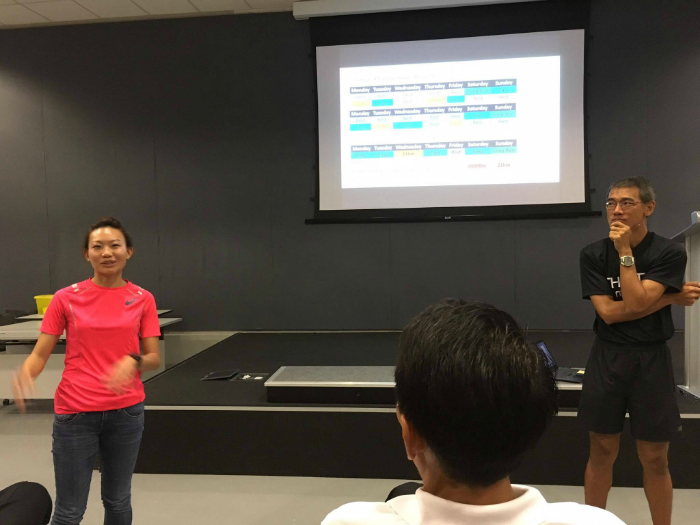
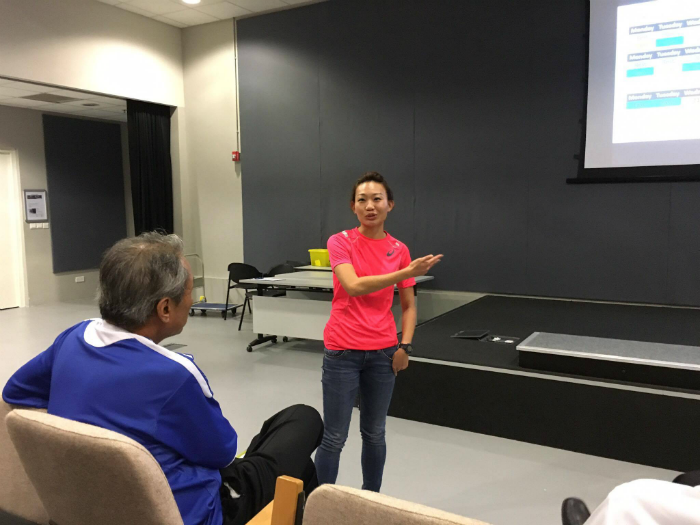
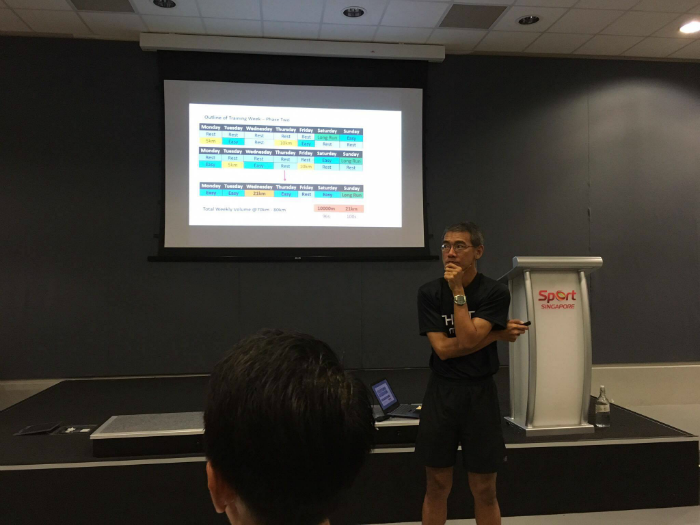
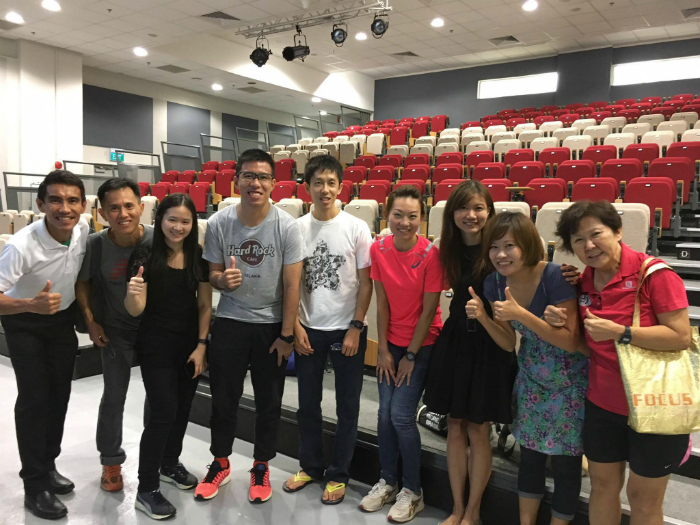
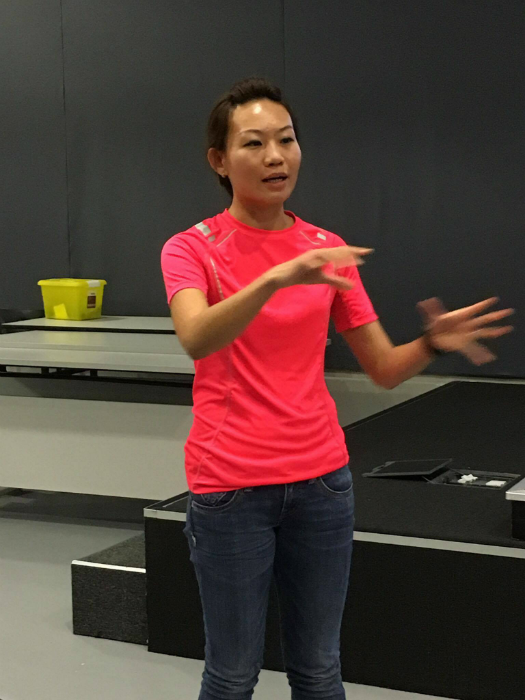
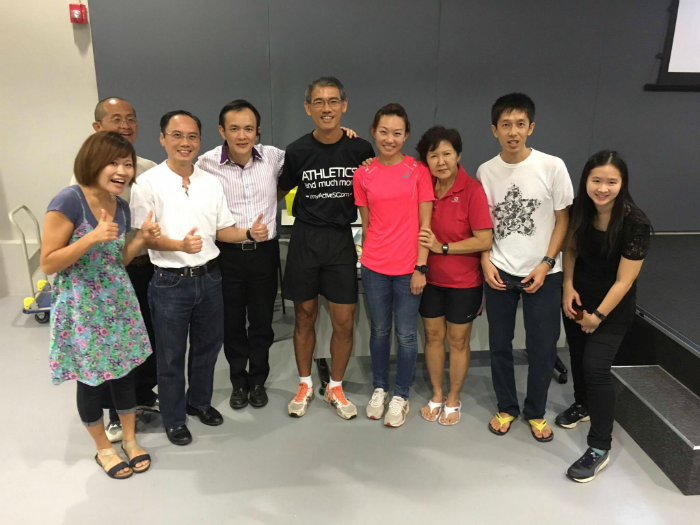
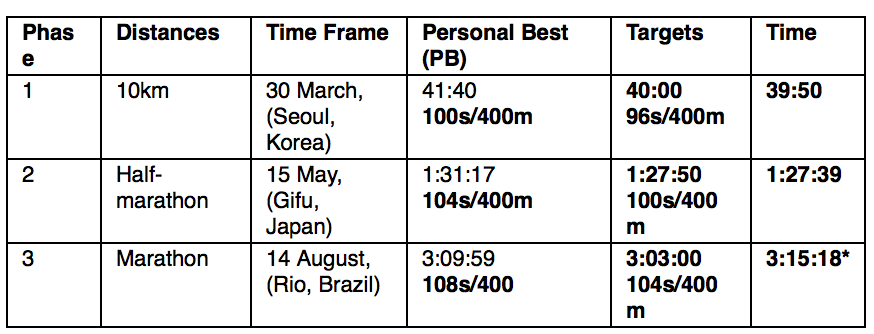
Leave a Comment